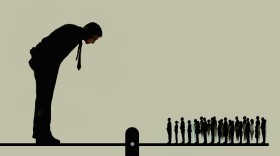
Shankar Vedantam
Shankar Vedantam is the host and creator of Hidden Brain. The Hidden Brain podcast receives more than three million downloads per week. The Hidden Brain radio show is distributed by NPR and featured on nearly 400 public radio stations around the United States.
Vedantam was NPR's social science correspondent between 2011 and 2020, and spent 10 years as a reporter at The Washington Post. From 2007 to 2009, he was also a columnist, and wrote the Department of Human Behavior column for the Post.
Vedantam and Hidden Brain have been recognized with the Edward R Murrow Award, and honors from the American Association for the Advancement of Science, the Society for Personality and Social Psychology, the International Society of Political Psychology, the Society of Professional Journalists, the National Association of Black Journalists, the Austen Riggs Center, the American Psychoanalytic Association, the Webby Awards, the Pennsylvania Associated Press Managing Editors, the South Asian Journalists Association, the Asian American Journalists Association, the Pennsylvania Newspaper Association, the American Public Health Association, the Templeton-Cambridge Fellowship on Science and Religion, and the Rosalynn Carter Mental Health Journalism Fellowship.
In 2009-2010, Vedantam served as a fellow at the Nieman Foundation for Journalism at Harvard University.
Vedantam is the author of the non-fiction book, The Hidden Brain: How our Unconscious Minds Elect Presidents, Control Markets, Wage Wars and Save Our Lives. The book, published in 2010, described how unconscious biases influence people. He is also co-author, with Bill Mesler, of the 2021 book Useful Delusions: The Power and Paradox of the Self-Deceiving Brain.
-
In 1979, dubious psychological techniques were used to put a teenager behind bars for life. These flawed ideas may still be at play in other criminal cases.
-
A type of discrimination is overlooked because it's rooted, not in hate, but in love. Our Hidden Brain team asks why good deeds, those we do for spouses or neighbors, can sometimes lead to injustice.
-
Recessions typically damage workers' long-term earnings. NPR's Hidden Brain podcast explains how a study found that students graduating from high school during a recession may be an exception.
-
We don't always behave the way economic models say we will. We don't save enough for retirement. We give money to charity. This week, why we act in ways that go against our "rational" self-interest.
-
A recent study found students may inadvertently choose their college major, in part, based on how tired they were in the subject's introductory course — especially if it was an early morning class.
-
In a fit of anger or in the grip of fear, many of us make decisions that we never would have anticipated. Researchers say it is very hard to understand how we'll act in certain situations.
-
It's been debated a long time: Does being part of organized religion improve your mental health? A new study finds that religion can buffer adolescents against depression.
-
As a society, we talk about sex more openly today than ever before. But so much still goes unsaid. This week on the Hidden Brain radio show, complicated stories of intimacy and attraction.
-
Physicians believe placebos work only if patients think they're getting medicine. In other words, doctors have to deceive patients. But there might be a way to get placebos to work without deception.
-
This week on the Hidden Brain radio show, we dig into the culture and psychology that determines the foods that make us salivate and the scents that make us squirm.
-
Decades ago, a group of women accused a prominent playwright of sexual misconduct. For the most part, the complaints went nowhere. In 2017, more women came forward. This time, people listened.
-
This week on Hidden Brain's radio show, we tackle a big topic: power. From our conflicted feelings toward the powerful, to the ways we gain and lose power ourselves, and how power can corrupt.






